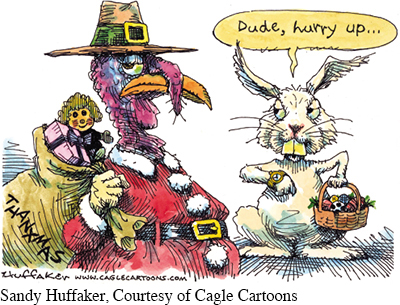Types of Irony
Although all irony depends upon some incongruity between expectation and reality, there are specific types of irony that you’ll recognize in advertising, speeches, and literary texts: verbal, situational, and dramatic irony.
Verbal irony, like the example that opened this Workshop, is saying one thing while meaning the opposite. Much of verbal irony depends upon context. If, for instance, someone says, “What a great day for a hike!” the context lets you know if the meaning is literal or ironic. If it’s a sunny day with temperatures in the seventies, the comment is probably literal. If it’s raining cats and dogs with gale force winds, then the comment is probably ironic. Verbal irony may result in humor or sarcasm, again depending upon context. In conversation, we can usually spot verbal irony because of a tone of voice, or possibly eye rolling or other gestures, but when we’re reading we have to be alert to context cues that signal an ironic tone.
In “Facebook Sonnet,” author Sherman Alexie writes, “Let’s all play the games / That occupy the young” (ll. 8–
Situational irony involves a discrepancy between what is expected to happen and what actually happens. If you’re reading a story about an elderly man who fits the stereotype of a sweet grandfather, but it turns out that he’s an evil mobster, that’s situational irony: the situation is the opposite of what you would expect.
The following cartoon illustrates situational irony with humor: we would expect a locksmith—

There’s situational irony at the end of Firoozeh Dumas’s piece “Hot Dogs and Wild Geese.” While we’ve been led to expect that the parents will continue to grow proficient in English under the tutelage of their daughter, the narrator surprises us by her point that “the wave of immigration” from Iran has resulted in shops where her mother can speak “in Persian, all by herself” with no help from her daughter. All along, we’ve been assuming that her family will change and blend into American culture, yet Dumas ends by reminding us that American culture was changed by her family’s culture. This reversal exemplifies situational irony.
Dramatic irony results when the audience is aware of something that a character is unaware of. A classic example is the horror movie where the protagonist thinks he is protecting himself by hiding in a basement when, in fact, the audience knows that the monster has been waiting in the basement all along. In Shakespeare’s play Julius Caesar, the audience knows that Brutus is plotting to kill Caesar, but Caesar believes Brutus is a loyal friend. Throughout the play Cyrano de Bergerac, Roxane is unaware that the words she finds so alluring are written by Cyrano, though often delivered by Christian, while the audience knows the loving and poetic speeches are not only Cyrano’s words but his feelings.
ACTIVITY
Identify which type of irony—
In Cinderella, the charming prince searches for the lady who lost her slipper at the ball, and whom he believes is a princess.
 REAL LIFE ADVENTURES © 2003 GarLanco. Reprinted with permission of UNIVERSAL UCLICK. All rights reserved.
REAL LIFE ADVENTURES © 2003 GarLanco. Reprinted with permission of UNIVERSAL UCLICK. All rights reserved.In Romeo and Juliet, Romeo believes that Juliet has drunk poison, when in fact it was just a sleeping potion. Believing Juliet to be dead, Romeo kills himself in grief.
Page 841At the end of “Children as Enemies” by Ha Jin (p. 763), the grandfather narrating the story explains that he and his wife have moved out of his son’s home, and that their move to America to be close to family has not turned out as they had hoped. The grandfather concludes by saying: “This is America, where we must learn self-
reliance and mind our own business” (par. 61). In the balcony scene of Cyrano de Bergerac (pp. 713–724), Roxane succumbs to the eloquent words of Cyrano proclaiming his love for her; she believes that Christian, who is speaking, has come up with those words.
 Toby Allen/Specialist Stock/Getty Images
Toby Allen/Specialist Stock/Getty ImagesIn Narrative of the Life of Frederick Douglass, the author recalls his feeling that “learning to read had been a curse rather than a blessing” (par. 6).
After the soccer player sprained her ankle, she limped off the field with the comment, “float like a butterfly, sting like a bee!”
The “Get Well Soon” flowers you sent to your friend in the hospital ended up giving him a terrible allergic reaction.
In Cyrano de Bergerac, Roxane keeps the letter that she believes Christian wrote to her next to her heart, regarding it as “a holy reliquary” (Act 5, l. 44) during her years of mourning.
 Sandy Huffaker, Courtesy of Cagle Cartoons
Sandy Huffaker, Courtesy of Cagle Cartoons